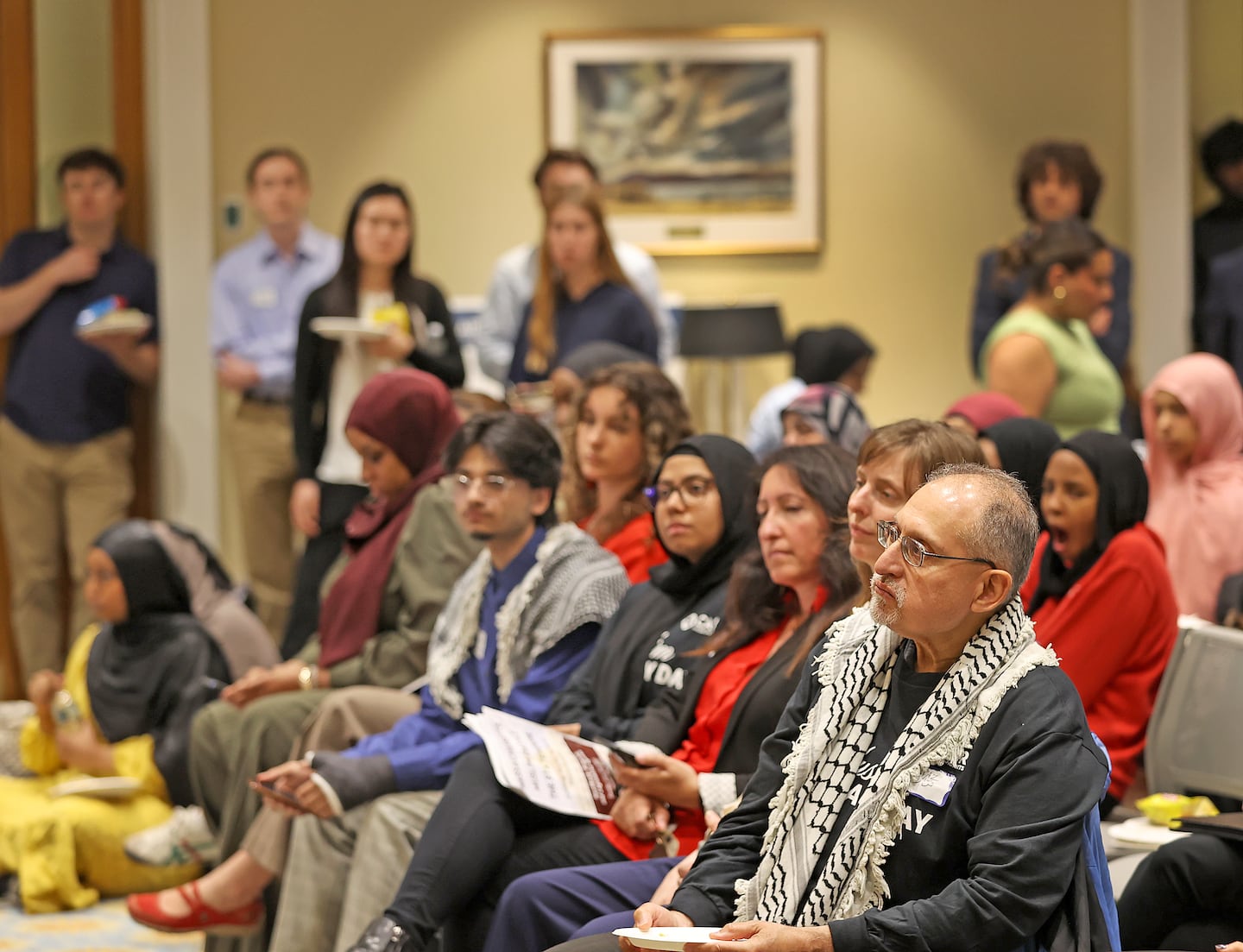Write to us at startingpoint@globe.com. To subscribe, sign up here.
As a college sophomore at Wesleyan in 1977, Fred Hewett was a self-described nerd who spent most of his time in the library, chemistry lab, or playing Frisbee. He largely avoided politics. But even he couldn’t miss the chaotic scene unfolding in Seabrook, N.H., where thousands of environmental activists were trying to block the construction of a nuclear power plant.
The 1977 protests, which helped delay the opening of the Seabrook plant until 1990, led to 1,400 arrests. They also reflected the idea, common among liberal activists then, that nuclear power was dangerous. “Being antinuclear was part of environmentalism,” said Hewett, who followed the Seabrook protests in local media.
But over the years, as Hewett became a writer on energy issues and learned more about the threat of climate change, the criticisms of nuclear power he once sympathized with began to seem wrong-headed. In 2023, he wrote an article for WBUR explaining his about-face. “If the goal was to cut carbon, the nuclear option had to be on the table,” he wrote.
Hewett is among a growing contingent of liberals embracing nuclear power as a complement to solar, wind, and other renewable energy sources. Strong majorities of Republicans and independents also favor nuclear power, creating a surprisingly bipartisan issue in a partisan age.
Today’s newsletter explains why both parties have gotten more bullish on nuclear — and why it still faces opposition.
Even factoring in the climate costs of building and fueling power plants, nuclear power is a far cleaner source of electricity than oil, natural gas, or coal. It also skirts some of the downsides of renewables, such as the acreage required to scale up solar power, Hewett said.
It may better fit the political zeitgeist, too. President Trump has called renewable energy a “scam” and tried to block the construction of coastal windmills. But he has also signed executive orders aimed at quadrupling US nuclear energy output over the next 25 years. His budget would reorient funding for clean energy toward nuclear power. And where his House-passed tax bill would quickly phase out Biden-era credits for renewable energy, it keeps them around longer for nuclear.
“The political winds are at the back of the nuclear industry now,” Hewett said.
Hewett also argues that nuclear energy, despite its reputation, is relatively safe. Yes, there have been three major accidents over the past four decades, including Three Mile Island in Pennsylvania, Chernobyl in the Soviet Union, and Fukushima in Japan. Chernobyl’s death toll is disputed, but estimates from the World Health Organization and others put it in the thousands, mostly from radiation-induced cancers years after the meltdown. That’s a small fraction of the global deaths each year from extreme heat, more intense storms, and other consequences of climate change and air pollution from fossil fuels. Relatively new reactor designs could also reduce the risk of accidents.
Many Republicans doubt the science of climate change and prefer fossil fuels to renewable energy; some of their enthusiasm for nuclear power may simply reflect disdain for liberals like those who tried to block Seabrook, said Andrew Cline, who leads the Josiah Bartlett Center for Public Policy, a free-market think tank in New Hampshire. “There’s a lot of people on the right who just associate windmills and solar panels with Vermont hippies.”
But Cline also argues nuclear power is more reliable than those other methods. Solar panels need daylight and turbines need wind to generate electricity; nuclear power plants can operate continuously.
National security is another motive. The US mines little of the uranium it uses to fuel its 53 operational nuclear plants. But even importing it would reduce the country’s dependence on foreign oil. “Some of the conservative affinity for nuclear power is that it’s sort of a patriotic, rah-rah American thing,” Cline said.
The bipartisan interest in nuclear power has yielded some changes already. Last year, then-President Biden signed legislation meant to streamline reactor building. Nuclear is already New England’s second-biggest source of electricity and generates nearly 20 percent of the country’s.
Yet hurdles to wider adoption remain. Some are economic. The up-front costs to build a nuclear power plant are high. Others are regulatory. Protesters delayed Seabrook’s opening, but cost overruns and onerous government rules also contributed. In recent years, the median amount of time it took to build new reactors was more than 7 years.
Other challenges are political. Despite converts like Hewett, Democrats remain evenly split on nuclear power. Many mainstream climate and environmental groups don’t support expanding it, including the Sierra Club, the MA Youth Climate Coalition, and Unitarian Universalist Mass Action in Massachusetts. Some critics prefer prioritizing wind and solar. Others cite the technical challenges of maintaining aging and even decommissioned nuclear facilities (the US has no permanent national facility to store and secure spent fuel, which can remain radioactive for millennia).
The right’s commitment to nuclear power is also uncertain. The Trump administration has canceled millions of dollars in federal grants (🎁) for physics, engineering, and technology research, although the National Science Foundation says it will focus on funding priorities including nuclear energy. And nuclear power has enjoyed bipartisan support in the past without taking off.
Still, Cline sees a future in which innovation makes nuclear both a climate-friendly and low-cost energy source capable of powering everything from electric cars to artificial intelligence data centers. “The environmentalists are looking for no emissions. The conservatives are looking for low cost and reliability,” he said. “That would be an amazing world.”
🧩 8 Across: Drained of color | ☀️ 84° Sun, warmth, haze
 Muslims told Massachusetts lawmakers stories of Islamophobia during a day of lobbying at the State House yesterday.David L. Ryan/Globe Staff
Muslims told Massachusetts lawmakers stories of Islamophobia during a day of lobbying at the State House yesterday.David L. Ryan/Globe StaffMassachusetts and New England
Trump administration
Congresswoman charged: A grand jury indicted Representative LaMonica McIver, a New Jersey Democrat, on charges of interfering with immigration officials during a protest outside an ICE facility last month. McIver called the charges “a brazen attempt at political intimidation.” (Politico)The Army turns 250: Trump gave a campaign-style speech at Fort Bragg, where uniformed soldiers, who are supposed to be apolitical, booed Biden and “the fake news” and cheered when Trump said he would rename a base for Robert E. Lee. (CNN)Homeland: Secretary of Defense Pete Hegseth suggested to lawmakers that the US would expand the use of troops to “secure” the country. (AP)Crisis comms: Harvard has taken to TV, newspapers, and social media to explain to Americans how its research, which the administration has threatened, benefits them.Underwater: Health secretary Robert F. Kennedy Jr. is about as unpopular as Trump in New England, a Suffolk University/Globe poll finds.Cuts: Senators of both parties grilled Trump’s National Institutes of Health director over a proposed $20 billion cut to the agency, which funds biomedical research. The cuts, and Kennedy’s skepticism of mRNA vaccine technology, have worried Massachusetts’ biotech industry.Tariffs: Higher food costs have New England restaurants bracing for a lean summer. But some companies — like a metal machining company in Avon — are benefiting from Trump’s import duties.
The Nation and the World
New Jersey governor’s race: Representative Mikie Sherrill, a Democrat, will face Jack Ciattarelli, a Republican former state assemblyman, in November. (NJ.com)LGBTQ+ rights: The Southern Baptist Convention, the largest Protestant denomination in the US, endorsed overturning the Supreme Court ruling that legalized gay marriage. (Dallas Morning News)Austria shooting: A gunman killed 10 people at a high school in the city of Graz. Police said the suspect, a former student, killed himself. (BBC)Greta Thunberg: Israel deported the Swedish climate activist and three others who tried to break Israel’s naval blockade of Gaza to deliver aid. (Times of Israel)
❤️ Love letters: Is it OK to tell a friend that nobody likes their partner?
😴 Say goodnight: This TikTok trend is helping people deepen their friendships. (HuffPost)
🎥 TV magic: Massachusetts gave a “Dexter” spinoff a $23 million tax credit. Insiders say such largesse may not last.
🍽️ Taste of Somerville: The annual food and arts festival, which takes place this evening at Boynton Yards, features local restaurants, breweries, and wineries. (ToS)
🤔 Gut feeling: Ask these questions to figure out when to trust yours.
📚 Murder mystery: From Ted Bundy to Gary Ridgway, lots of 20th century serial killers were products of the Pacific Northwest. A new book offers a theory. (Slate $)
Thanks for reading Starting Point.
This newsletter was edited by Andrew Caffrey and produced by Teresa Hanafin.
❓ Have a question for the team? Email us at startingpoint@globe.com.
✍🏼 If someone sent you this newsletter, you can sign up for your own copy.
📬 Delivered Monday through Friday.
Ian Prasad Philbrick can be reached at ian.philbrick@globe.com.
